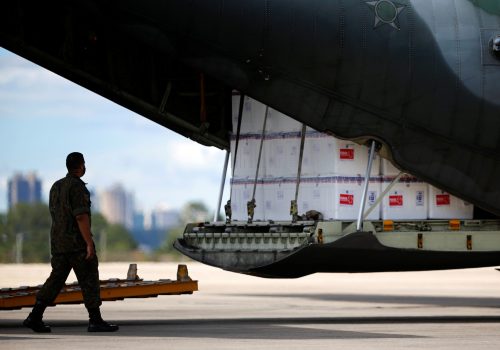Humanitarian aid: Defining new areas of US-LAC collaboration
Executive summary
The US humanitarian assistance and disaster relief (HADR) system—well practiced and extensively developed—could further serve US and partners’ needs in Latin America and the Caribbean (LAC) and beyond through targeted improvements. Based on our experience as HADR practitioners with operational and academic expertise, we share insights from many years of working with partners in the Americas. The task is urgent: fragile governments and organizations further impacted by COVID-19 and climate change have exposed HADR deficiencies that need to be rapidly strengthened. Redoubling the US’s HADR commitment to allies and partners can also have strategic benefits during a period of renewed competition with the People’s Republic of China.
We believe that the United States can strengthen its HADR work globally, and particularly with LAC countries, through partnership and relationship building as well as education and exercises. By deepening its strengths and address- ing room for improvement, the United States can remain the partner of choice for LAC countries and conserve its positional advantage over China and other strategic competitors.
How can LAC and partner nations (such as the United States), nongovernmental organizations, and regional and other global organizations strengthen their abilities to respond to natural disasters? What can the United States do to improve its disaster preparedness and response in LAC? And what can Washington learn from Beijing’s approach to disaster assistance in LAC?
In crafting this report to address these questions, we drew from a roundtable discussion, verbal and written consultations with subject matter experts, and written material. A full description of the methodology is provided in the appendix.
The findings of the report include eight recommendations grouped under two mutually complementary areas: (1) partnership and relationship building, and (2) education and exercises. Not only are these recommendations timely and relevant for HADR practitioners, but taking these steps would strengthen Western hemispheric security by investing in the region’s infrastructure and human capital. As the United States and its LAC partners consider future room for cooperation and collaboration, HADR work will form an indispensable centerpiece of their strategies.
Related content

The Adrienne Arsht Latin America Center broadens understanding of regional transformations and delivers constructive, results-oriented solutions to inform how the public and private sectors can advance hemispheric prosperity.
Image: 201127-N-YD864-2096 SOTO CANO, Honduras (Nov. 27, 2020) - Members of Helicopter Sea Combat Squadron (HSC) 22 Detachment 6 assigned to the Freedom-variant littoral combat ship USS Sioux City (LCS 11) join U.S. Southern Command’s Hurricane Iota relief efforts in Central America, Nov. 27, 2020. Sioux City is deployed to the U.S. 4th Fleet area of operations to support Joint Interagency Task Force South's mission, which includes counter illicit drug trafficking in the Caribbean and Eastern Pacific. (U.S. Navy photo by Mass Communication Specialist Seaman Juel Foster/Released)

